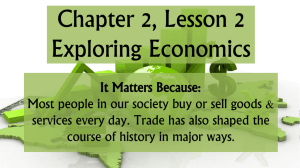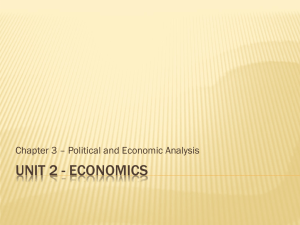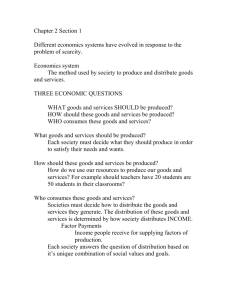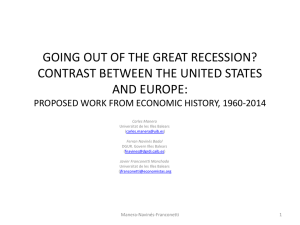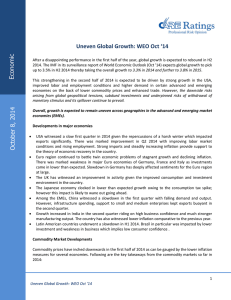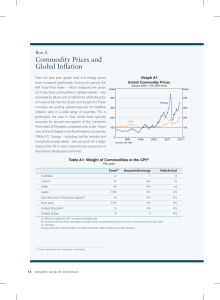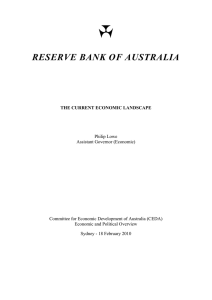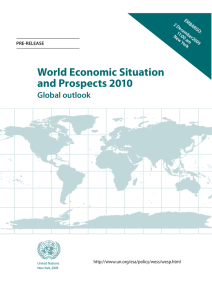Chapter 2.2 Exploring Economics
advertisement
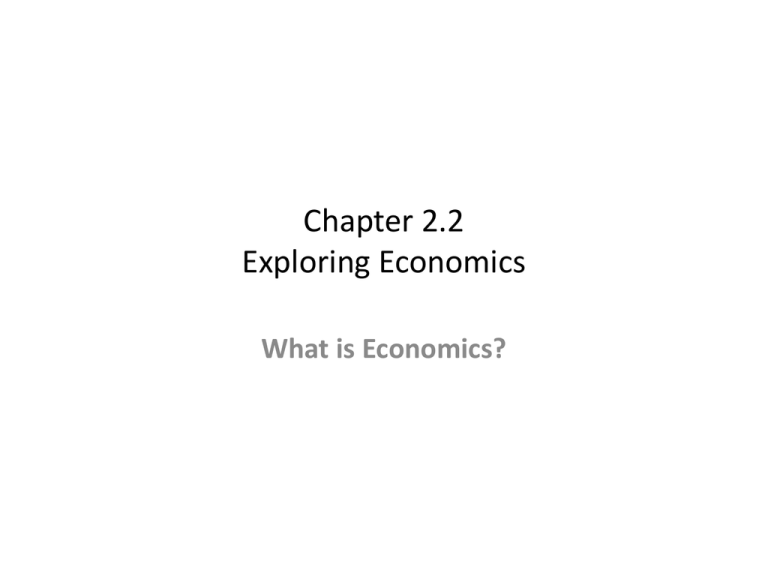
Chapter 2.2 Exploring Economics What is Economics? • 1. There are three key questions to ask about any economy. • A. What goods and services should we offer? • B. How should we create and distribute these goods and services? • C. Who will use these goods and services? Resources and Production • 1. In order to make goods and offer services, people need resources. • 2. There are four major kinds of resources: • A. Land • B. Labor • C. Capital • D. entrepreneurship • • • • • Resources will produce: A. Cars B. House C. Food D. Computers • 3. Labor: is the ability of people to do work • 4. Capital: is money and goods used to help people make or do things. You need capital to run a business. • 5. Entrepreneurship: is the act of running a business and taking on the risks of that business. • 6. technology: is using knowledge in a practical way to accomplish a task. It can make it easier and cheaper to create goods. Supply and Demand • 1. supply: is the amount of a good or service that a producer wants to sell. • 2. demand: is the amount of something that a consumer wants to buy. • 3. The law of demand says that the lower the price of a good or service, the more of it people will want to buy. • 4. Scarcity: when not much of a needed resource is available, then the demand for it will grow. The higher the demand will raise the price. • 5. opportunity cost: is what you give up to make it or buy it. Suppose you are a farmer, you choose to grow wheat on your land. You spend time and resources to grow the wheat. While you are growing wheat, you cannot use the land to grow beans. You are giving up the chance to grow something else when you grow wheat. We are always weighing the opportunity costs of their choices about what to make or buy. Managing and Measuring Economies • 1. Dealing with resources, supply, and demand can be very hard. Each society organizes its economy using an economic system. • 2. A traditional economy is based on custom. In such an economy, children often do the same work as their parents. Members of a family or tribe make goods for the rest of their group. In this way, everyone’s needs are met. Many hunter gather groups had traditional economies. • 3. In a command economy, a central government decides what goods will be made and who will receive them. Today, Cuba and North Korea have command economies. • 4. In a market economy, each person or individual, makes choices about what to make, sell, and buy. The U.S. has a market economy. Measuring Economies • 1. Economies grow and shrink over time. This pattern is called the business cycle. When the economy grows quickly, it is often called a boom. • 2. When the economy grows very slowly or shrinks it is called a recession. In a recession, companies often close and people lose their jobs. The U.S. entered a recession in December 2007. • 3. Governments try to keep their economies growing and avoid recessions. • One way they do this is by watching prices. Rising prices are a sign of inflation. High inflation means that money buys less. This raises the cost of living. Say the yearly rate of inflation is 10%. This means that something that cost you $10.00 last year will cost you $11.00 this year. Trade in World History • 1. Why do people trade? • 2. Two countries trade with each other when both sides can gain something from the exchange. • 3. Exports are goods shipped out of a country and sold somewhere else. • 4. Imports are the goods and services that a country buys from other countries. • 5. Example: We sell corn to Japan for silk and spices. • 6. Early civilizations often traded by bartering. When people barter, goods and services are traded for other goods and services. • 7. For example, people might trade fish for furs. Eventually, some ancient peoples invented money. Money had a set value, could be traded for anything, and was easier to carry. Barriers to Trade • 1. Taxes, • 2. Limitations • 3. banning goods that hurt farmers. Global Trade • 1. Today, most of the world’s countries take part in some form of international trade. This is called globalization.
